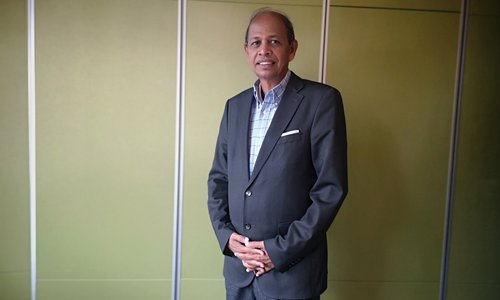
Dato' Abdul Majid Ahmad Khan Photo: Xie Wenting/GT
This year not only marks the milestone of the 10th anniversary of the Belt and Road Initiative (BRI) but also serves as a testament to the transformative impact it has had on the numerous countries in the Global South. As the world faces a complex web of geopolitical intricacies and intense confrontations, the third Belt and Road Forum for International Cooperation (BRF) offers a refreshing platform and sustainable way to achieve harmony and win-win, Dato Majid, president of the Malaysia-China Friendship Association and former Malaysian ambassador to China, told the Global Times on Wednesday.
"The 21st century is undergoing a profound geopolitical reconfiguration, as we witness the evolution of a once Western-centric world order into a more pluralistic global landscape. In this background, we NGOs should continue to build on the BRI's successes of the past decade and explore new avenues for collaboration," Majid said.
"By continuing to foster dialogue, investing in education and healthcare, and promoting inclusive policies, we can further enhance the socio-economic progress spurred by the BRI. Together, we can create a future where every nation, regardless of its size or resources, can fully harness the potential of the BRI, fostering a world of shared prosperity, innovation, and mutual understanding," the envoy stressed.
"As we celebrate the progress achieved over the past decade, we are reminded of the immense positive change that the BRI has brought to the diverse communities and economies in the participating countries. However, even as we acknowledge these accomplishments, we remain mindful of the challenges that persist and that we as NGOs must continue to foster collaborations and enhance socio-economic progress," he noted.
Majid believes that the current era of uncertainties casts a shadow over collective efforts to address pressing global challenges, including persistent social-economic inequity, the looming threat of future pandemics, and the worsening risks associated with climate change and aspects of technological advancement.
To fight against these challenges, Majid called for the global community to come together, transcend political divides, and prioritize collaborative solutions. And the BRI is one of those sustainable solutions.
"By fostering a spirit of cooperation, empathy, and shared responsibility, we can navigate this period of uncertainties and work toward a future where social, health, and environmental challenges are met with resilience, determination, and unity," he said.
As the year 2024 will mark the ASEAN-China Year of People-to-People Exchanges, Majid hopes the platform can be utilized effectively to further deepen people-to-people connectivity and mutual understanding.
"By bolstering collaboration between ASEAN countries and China, we can create a resilient economic network that facilitates increased trade and investment, leading to a shared prosperity and mutual benefits for all parties involved," he said.
Majid underlined that Chinese-proposed initiatives such as the Global Civilization Initiative, to which Malaysia is deeply committed, also play a pivotal role in fostering cross-cultural understanding and people-to-people connections.
"By encouraging dialogue, promoting cultural exchange programs and investing in education, we can bridge the gaps of misunderstanding and promote tolerance and acceptance among nations and communities. Through such endeavours, we can cultivate a global society where mutual respect, empathy, and cooperation serve as the foundation for meaningful and lasting relationship," Majid said.




